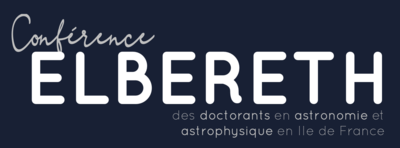Orateur
Description
The observation of rocky planets and older giant planets requires an attenuation of the star flux by a factor of 10^10 to 10^9. At this level of performance, active wavefront correction is critical to compensate the effects introduced by polishing quality, alignment errors, coronagraphic defects, thermal expansion, etc...
The correction requires, on the one hand, an unbiased measurement of the aberrations before the coronograph and, on the other hand, an algorithm to minimise the intensity of the star in an area of the image called Dark Hole.
Different techniques have been suggested for the measurements and the algorithms, including three techniques that have been tested in the laboratory at spatially representative contrast levels (10^8-10^9): Self-Coherent Camera (Mazoyer et al. 2014), Pair-Wise+Electric Field Conjugation (Give'on et al. 2011) and Speckle Nulling (Trauger & Traub 2007). Two of these techniques have been implemented on the LESIA's THD bench (Potier et al. 2019) but numerical and instrumental simulations are still needed to determine an algorithm optimised for Nancy-Grace-Roman Space Telescope (NGRST). One of the techniques that has not been intensively tested yet is the non-linear Dark Hole algorithm proposed by ONERA. This algorithm theoretically allows to converge to a stable and optimal solution in a very small number of iterations, which would save precious time on instrument calibration.
The PhD project is focused on the optimization of this algorithm, its instrumental validation on the LESIA THD bench and the demonstration of the scientific added value it will provide to the NGRST mission. It is part of a collaboration between ONERA and LESIA supported by CNES. Part of the work will also be dedicated to estimates of the added value provided by such an algorithm on the astrophysical performance of the mission.
Day constaints
Monday afternoon after 2pm
Thuesday all the day
Wednesday before 12:00 pm
Thursday afternoon after 2pm
Not available Friday
| Field | Instrumentation |
|---|
